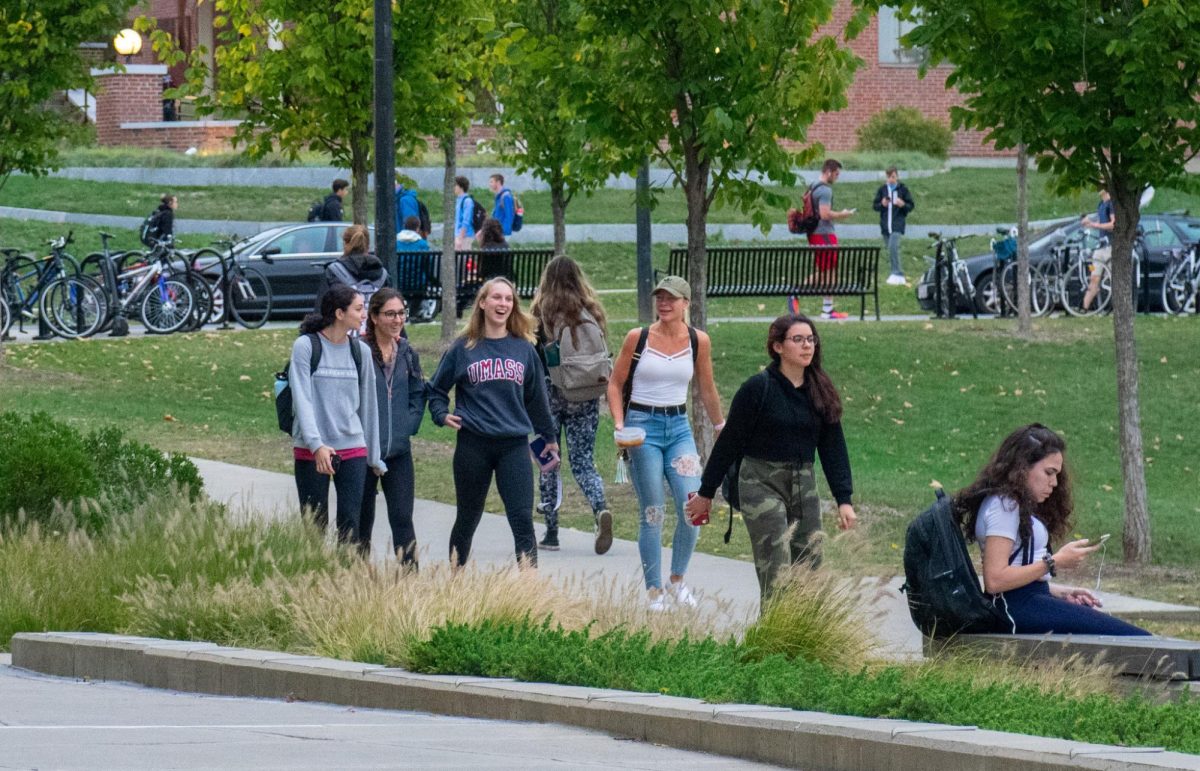The lobby is overflowing with awaiting spectators. The line swerves around an imaginary rope. People stand patiently. There is not enough room to hold the growing crowd. The concession stand line has been swallowed up by the line waiting to see a movie. People are trying to get a cup of tea or some popcorn, while others wait for the theatre showing “Juno” to open up. “Juno” has sold out every Saturday night since its debut at Amherst Cinema. It’s the Cinema’s “bread and butter.” Soon it will be relocated to Northampton’s Pleasant Street Theatre.
On Nov. 22, 2006, the movie-loving crowd of Amherst and surrounding towns was given a new place to view movies. Amherst Cinema had finally been completed and opened. The people of Amherst dreamed of a cinema to show them the movies they yearned for.
For many years, the Pleasant Street Theatre in Northampton cornered the market on independent films. The theatre was less than state of the art. The sound quality was poor. The film projectors were old and broken. The screens were not the correct size for the picture formatting of movies. There wasn’t stadium seating and people over six feet tall become obstacles to other viewers and the projectors.
Pleasant Street was neglected for years. And it was showing.
Amherst Cinema opened and offered everything that the high-priced chain movieplexes offered. The theater opened with stadium seating, state-of-the-art sound and projection equipment, and comfortable seats. It is a state-of-the-art cinema that satisfies movie lovers by playing 35mm prints of movies.
The story of Amherst Cinema goes a long way back. The building the cinema is housed in has a rich history. It was once a part of Amherst Academy in the late 19th century and early 20th centuries. It was the livery for the school that was a landmark in Amherst’s Center. Amherst Academy was a school that many now-famous individuals had attended, namely Emily Dickinson and Sylvester Graham (inventor of the great graham cracker).
A fire downtown in 1926 transformed the livery forever. The building was bought and a theater was built inside. The theater had an orchestra pit and a stage for musicals, plays and concerts. It also had a movie cinema built to show film reels. The theater was a popular spot, and in 1955, Samuel Goldstein purchased the space.
The theatre space was renamed Amherst Cinema, a place that became a popular mainstay for local film buffs. People even went to see the films as the building was deteriorating. Film lovers wrapped themselves in blankets in the winter to stay warm because there was no heat. But after years of health and safety code violations and the mismanagement of taxes, the building was closed.
A group of local film enthusiasts, movie lovers and historians purchased the building with dreams of constructing an all-encompassing art building inside. But with a lack of funding and practical planning, they had to give up their dreams and ask for help from someone who had the know-how to create their dream.
Barry Roberts, a local builder and philanthropist, had the money the community needed to improve the cinema, but on certain terms. The idea of establishing an art gallery in the building wouldn’t bring in the revenue needed to pay for the building and the fees. So a plan was proposed to build shops, caf’eacute;s and a new cinema that could bring in revenue while keeping the building a local hot bed. Once all of the finances were paid off, the cinema would be completely free from any financial constraints.
Now the cinema is independent of corporate ties. It is a non-profit run cinema that is trying to live up to the promise that it has given to the people of Amherst.
“Money is hard to come by,” said Beth Roberts, the general manager of Amherst Cinema. It’s a phrase that she repeats often when talking about the cinema. She has a lot on her plate as one of the cinema’s two full-time employees. The cinema itself employs a number of students, aspiring filmmakers and other locals in the area who work for “the love of it.” The employees run the concession stands, projection booths and ticket sales all for minimal pay.
The movie industry is a tough one, and running a cinema runs parallel with filmmaking. You have to find an audience and give that audience what they want. Roberts seeks out films she thinks will fit the taste buds of the moviegoers in Amherst. But she has to raise money to show those films and the money is hard to come by.
Amherst Cinema only gets 50 percent of ticket sales. When showings aren’t selling out, the cinema loses money. The films distributors don’t only take profits, they also set the schedule for the showings. This often impedes the ability of some would-be patrons to see a film. Distributors want a film shown a certain number of times a day at certain hours. This can restrict the flow of people who want to see a film and hurt business for a Cinema with only three screens.
Then there is the idea of borrowing reels of older movies from the archives. This may sound like it would be cheaper than getting new releases. Why not just get some old film that isn’t showing anywhere else? No one wants to show it, so wouldn’t it make sense that it would be cheaper to show?
Wrong. Films are archived and cost money to borrow. Shipping of the films is also very expensive – the shipping cost is in the realm of $250 to $500. You have to cut out a regular showing of a picture to put in an older film, and that doesn’t sit well with distributors – the cost of the film is never fully covered.
Budgeting is difficult when you only have three theatres. One theatre is large, around the average size for any Regal Cinemas or AMC across the country. The other two house around 45 people. Cinemas aren’t making profit on the size of a crowd, but on the devotion of fans all week. They need a constant flow of people to make a profit.
Where does the funding for the films come from? It comes from donations and grants. Roberts has to write out numerous grants to gain the money necessary to have the films the people of Amherst want shown. She then has to hope people go to the movies. When asked when the cinema has lost money on a film, Roberts answered, “We’ve lost a lot of money on the weekly children’s movies.”
The expenses eventually outweighed the rewards on the program that showed every Saturday. It had to come to an end. Roberts then had to come up with a new option for stay-at-home parents in Amherst.
The cinema now has “baby-friendly” showings of films. The movies themselves are not for toddlers, but for parents who are stuck at home all day with their newborns or infants. It’s a showing that allows baby crying, whining and whimpering. It’s a concept that has allowed parents of small children the chance to leave the confines of their homes. It has been successful. The program does not impede on the scheduling of movies; rather, it takes an early showing of a film and designates it as a “baby-friendly” movie once a week.
Roberts has also come up with some other unique ideas for the cinema. The best example is the concession stand, which is a reflection of Roberts’ personality. She is “an academic and food lover,” and she has taken it upon herself to create a unique concession stand menu. It is also a reflection of the towns in the Pioneer Valley.
Roberts noticed that the Whole Foods in Hadley was outdoing the Big Y and Stop and Shop in business. She took this information and created a concession stand for those shoppers. The popcorn is popped with olive oil instead of other fatty oils. She also searched for a soda product void of caffeine and other additives. She found it in the Blue Sky Soda Company. The only problem with buying soda from such a small company was that they could not provide her with cups or the expensive soda fountain. She bought a soda fountain and discovered cups made of 100 percent corn starch. The cups decompose very quickly and are environmentally friendly. She is s
till searching for bio-degradable popcorn bags, but has had no luck.
The stand also serves tea, ice cream and nutrition bars. Roberts has given into selling mainstream candy like M’M’s and Skittles due to popular demand. But she has added fair-trade coffee to the menu, a widely popular item at her cinema. She brought up the fact that her sister is a chef, something that has helped her bring in some more nutritional items like sandwiches, soups and salads. She came up with the idea of a healthier concession stand because she hated the stuff being sold at the big-time movie cinemas. “Small nachos are gross,” she said after explaining the failure of the sandwiches and soup attempt at the stand.
Amherst Cinema has recently purchased Pleasant Street Cinema, and is working to re-vamp it. The two movie theatres are non-profit and independently owned. They are two cinemas with a mission to give the people of the Pioneer Valley a broader view of films in the world today.
With a number of special events, the cinemas are trying to fulfill their mission to the people of the valley. The upcoming instrument petting zoo at Amherst Cinema will allow parents to bring their children to touch, play and see a wide array of instruments on display. There is also the ongoing Arthouse Film Series every Sunday and Thursday. It is a series of films that are not so well known to the public, but have inspired generations of filmmakers.
The two cinemas are fighting to stay afloat and give the art- and movie-going community of the Pioneer Valley what it wants while still serving the general public. Movies like “Once” played for 12 consecutive weeks in Amherst. And “Juno” has been a big hit among fans of all ages.
The two cinemas are trying to give independent cinema a home in Western Massachusetts along with some unique local touches.
Kevin Koczwara can be reached at [email protected]






